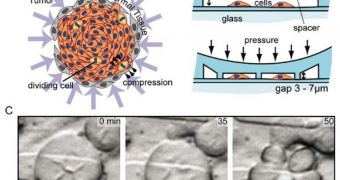A group of bioengineers from the University of California in Los Angeles (UCLA) says that a recent analysis of cancer cell mitosis (cellular division) revealed the fact that these cells do not split up to form two daughter cells, but rather up to five descendants.
This may help explain why tumors are so prolific, and capable of spreading at such a fast pace. In mammals, cell division always results in the creation of two identical copies of the progenitor cell.
However, this limitation – which plays an essential role in ensuring the correct transmission of genetic data from one generation of cells to the next – appears to be removed in tumors, allowing them to grow between 200 and 300 percent faster than normal tissue.
This discovery may reveal a new molecular mechanism to target via novel therapies and drugs. If this processes that cancer cells use to spawn so many descendants are destroyed, then experts could at least limit the spread of the disease, and give patients more time to live.
The investigation was carried out by scientists at the UCLA Henry Samueli School of Engineering and Applied Science (SEAS). They were able to create a mechanical confinement platform that holds cells in the same type of 3D environments which they grow in inside the human body.
Up until now, cancer cell research was conducted on cells that grew in culture, in the lab. These cultures were grown inside Petri dishes, and the cells they contained were in no way confined. As soon as this conditioning was placed, cancer cells began producing between 3 and 5 offspring each.
“We hope that this platform will allow us to better understand how the 3-D mechanical environment may play a role in the progression of a benign tumor into a malignant tumor that kills” says the principal investigator on the new study, Dino Di Carlo.
The expert holds an appointment as an associate professor of bioengineering at the university. The science team now believes that cancer must damage the specific biochemical checkpoints that are set in place to ensure the tight regulation of mitosis. With these safety measures gone, the cells divide at will.
Scientists now plan to further investigate the importance of confined environments on the development of cancer and are seeking industry partners to aid in the effort. This behavior of cancer cells has never been observed before.
This line of study, as of yet unexplored, could finally lead to the development of an effective approach to addressing various forms of cancer.

 14 DAY TRIAL //
14 DAY TRIAL //